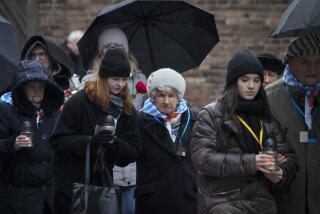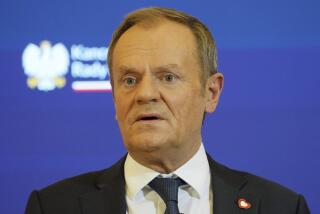Solidarity Is a Spent Force, Jaruzelski Says
WARSAW — Poland’s leader, Gen. Wojciech Jaruzelski, opened the first Communist Party congress in five turbulent years Sunday by declaring that Solidarity is disintegrating as a social force while Poland returns to normality and national “agreement.”
As visiting Soviet leader Mikhail S. Gorbachev looked on, the 1,776 delegates to the congress applauded warmly when Jaruzelski thanked the army for its assistance in suppressing the independent labor movement under martial law in 1981 and in helping to govern the country over the past five years.
Jaruzelski said the government is prepared to release some political prisoners in the near future in view of what he called a growing sense of national “agreement” and the “progressing decomposition and social isolation of anti-state groups,” the standard official description of the outlawed union.
But a demonstration in the western city of Poznan mocked his words. Clashes erupted there Sunday between riot police and anti-government demonstrators observing the 30th anniversary of the “bread and freedom” riots of June, 1956. More than 50 workers and 20 police were killed that year, and the city’s Communist Party and police headquarters were demolished in the two-day uprising.
The Poznan riots were the first of a series of worker revolts that culminated in the peaceful nationwide strikes of August, 1980, that gave rise to Solidarity.
10 Million Members
The independent union was legally recognized by the state for 16 months and had grown to 10 million members by December, 1981, when Jaruzelski, two months after assuming the party leadership, crushed the union under martial law.
Martial law was lifted in 1983. Solidarity, although outlawed and no longer able to influence state policy, remains a strong moral force in Polish society.
Reports from Poznan on Sunday said police used tear gas to disperse several thousand demonstrators who marched behind banners reading “Law, Freedom and Solidarity” following a memorial mass celebrated by Poland’s Roman Catholic primate, Cardinal Josef Glemp.
In his homily, Glemp criticized the “cynical” conduct of Poznan’s Communist authorities who in 1956 called in army tank forces to fight pitched battles with striking workers.
In an observation that contradicted Jaruzelski’s assertion of growing national harmony in contemporary Poland, Glemp said “an agreement in Poland remains an open matter.”
Stark Reminders
The Poznan anniversary, which fell coincidentally on the opening day of the party congress, was one of two stark reminders Sunday of the Communist Party’s inability during four decades in power to win broad popular acceptance and to work out definitive solutions to the country’s social and economic problems.
A few miles north of the Palace of Culture and Science in Warsaw, where the congress convened, a monthly pro-Solidarity mass at St. Stanislaw Kostka Church paid homage to the outlawed union’s slain chaplain, Father Jerzy Popieluszko.
Despite the presence of police patrols that turned away many younger worshipers, a crowd of several thousand gathered for an open-air mass and the dedication of a massive granite cross in the churchyard where Popieluszko is buried. Since his murder by three secret police officers in October, 1984, the site has become a national shrine to Solidarity and its democratic ideals.
The crowd applauded when a priest noted that Christianity came to Poland a thousand years ago “not by violence and the sword, but with an open heart,” in contrast with its ideological rival, communism.
The party congress is expected to give a formal stamp of approval to Jaruzelski’s leadership for another five-year planning period. It also gives him an opportunity to reshape the ruling Politburo and the party’s administrative makeup more to his liking.
Sign of Satisfaction
One member of the Soviet Politburo traditionally attends each of the party congresses held in sequence by Moscow’s political partners. But independent Polish observers said Gorbachev’s presence is a sign of the Kremlin’s general satisfaction with Jaruzelski and the political stability he has managed to achieve. Gorbachev is to address the congress today.
In the course of a largely rhetorical, four-hour speech, Jaruzelski dismissed the surviving elements of the Solidarity underground, recently reduced by a series of arrests, as “political rings” in the service of foreign enemies, and with little appeal to the nation.
“The opponent claims the Polish nation has become disappointed with socialism,” Jaruzelski said. “It is not true. A decisive majority of Polish society, in its feelings and aspirations, is in favor of the goals of our socio-political system.”
Citing what he called “spreading agreement” in society and improved public order and discipline, he said it could be possible to offer “one more chance to return to normal life for perpetrators of certain categories of offenses” against the state.
Polish sources said this appeared to confirm hints that the government would offer the latest in its annual series of partial amnesties for political prisoners this summer, probably on Poland’s July 22 national day.
The number of political prisoners currently stands at about 350, but the amnesty, or “humanitarian initiative,” as the government calls it, will probably exclude senior Solidarity figures such as the recently arrested underground leader Zbigniew Bujak, whose cases are in the hands of military prosecutors.
More to Read
Sign up for Essential California
The most important California stories and recommendations in your inbox every morning.
You may occasionally receive promotional content from the Los Angeles Times.










